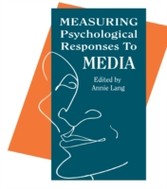Suchen und Finden

Measuring Psychological Responses To Media Messages
Characterized by its multi-level interdisciplinary character, communication has become a variable field -- one in which the level of analysis varies. This has had important ramifications for the study of communication because, to some extent, the questions one asks are determined by the methods one has available to answer them. As a result, communication research is characterized by the plethora of both qualitative and quantitative approaches used by its practitioners. These include survey and experimental methods, and content, historical, and rhetorical analyses. A variety of tools has been developed in cognitive psychology and psychophysiology which attempts to measure ",thinking", without asking people how they do it. This book is devoted to exploring how these methods might be used to further knowledge about the process of communication. The methods chosen have all been used extensively in cognitive and experimental psychology. Each chapter in this book is designed to describe the history of the method being introduced, the theory behind it, how to go about using it, and how it has already been used to study some area of communication. The methods introduced here vary widely in terms of the amount of equipment and training needed to use them. Some require only theoretical knowledge and a paper and pencil, others require more elaborate hardware and software for implementation. These methods also vary widely in terms of what sorts of variables they can be used to measure. Some of them adapt quite readily to traditional communication variables like persuasion, attitude change, and knowledge, others are more applicable to process type variables such as attention, arousal, involvement, encoding, and retrieval.
Alle Preise verstehen sich inklusive der gesetzlichen MwSt.











